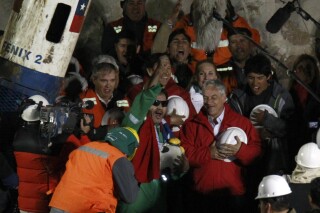Today in History: October 13, 33 Chilean miners rescued after 69 days underground

FILE - Luis Urzua, the last of the 33 miners to be rescued, center wearing green, celebrates next to Chile’s President Sebastian Pinera after being pulled from the San Jose gold and copper mine near Copiapo, Chile. (AP Photo/Roberto Candia, File)
Today’s Highlight in History:
On Oct. 13, 2010, rescuers in Chile using a missile-like escape capsule pulled 33 men one by one to fresh air and freedom 69 days after they were trapped in a collapsed mine a half-mile underground.
On this date:
In 1775, the United States Navy had its origins as the Continental Congress ordered the construction of a fleet.
In 1792, the cornerstone of the executive mansion, later known as the White House, was laid by President George Washington during a ceremony in the District of Columbia.
In 1932, President Herbert Hoover and Chief Justice Charles Evans Hughes laid the cornerstone for the U.S. Supreme Court building in Washington.
In 1943, Italy declared war on Germany, its one-time Axis partner.
In 1960, the Pittsburgh Pirates won the World Series, defeating the New York Yankees in Game 7, 10-9, with a home run hit by Bill Mazeroski.
In 1972, a Uruguayan chartered flight carrying 45 people crashed in the Andes; survivors resorted to feeding off the remains of some of the dead in order to stay alive until they were rescued more than two months later.
In 1974, longtime television host Ed Sullivan died in New York City at age 73.
In 1999, in Boulder, Colorado, the JonBenet Ramsey grand jury was dismissed after 13 months of work with prosecutors saying there wasn’t enough evidence to charge anyone in the 6-year-old beauty queen’s slaying.
In 2003, the U.N. Security Council approved a resolution expanding the NATO-led peacekeeping force in Afghanistan.
In 2007, Secretary of State Condoleezza Rice, after meeting with human-rights activists in Moscow, told reporters the Russian government under Vladimir Putin had amassed so much central authority that the power-grab could undermine its commitment to democracy.
In 2011, Raj Rajaratnam (rahj rah-juh-RUHT’-nuhm), the hedge fund billionaire at the center of one of the biggest insider-trading cases in U.S. history, was sentenced by a federal judge in New York to 11 years behind bars.
In 2016, Bob Dylan was named winner of the Nobel prize in literature.
In 2017, President Donald Trump accused Iran of violating the 2015 nuclear accord, but did not yet pull the U.S. out of the deal or re-impose nuclear sanctions. (Trump would pull the U.S. out of the deal the following May and restore harsh sanctions.)
In 2021, U.S. officials said they would reopen land borders to nonessential travel starting in November, ending a 19-month freeze because of the coronavirus pandemic.
In 2022, the House Jan. 6 committee voted unanimously to subpoena Donald Trump, demanding the former president’s personal testimony as it unveiled startling new video from his closest aides describing his multi-part plan to overturn his 2020 election loss.
